iEARN
is designed to help youth of all ages and nationalites cope with being bullied and teased. Students can contribute their personal stories, poems, oral stories, music, drawings, photographs, animations and films, and take a stand against bullying. 
The Motto of this Web site is "Where you are NOT alone," and, true to this, the shared stories can give other visitors a sense of hope and camaraderie.
|
The Laws of Life Project invites young people ages 9 to 21 to express, in their own words, what they value most in life. Participants interact with each other online. In addition, they are encouraged to use what they learned about values 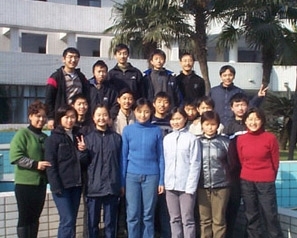 to initiate change within the community through action projects. to initiate change within the community through action projects.
Students in Chengdu, China's #9 Middle School have introduced a local school
for the blind and deaf to iEARN and Laws of Life. #9 Middle School students will
help blind students translate and type their messages into the
discussion forum.
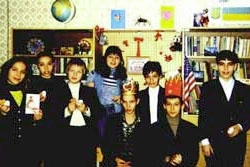 Students in Belarus will use Laws of Life as a framework to discuss
their thoughts and emotions about the tragedy of September 11. They
have started a project, "Children of Belarus Against Terrorism." Children write
essays and poems and draw pictures that express their Laws of Life. For more
information, contact Natalia Petriaeva, School # 14, Grodno, Belarus. Students in Belarus will use Laws of Life as a framework to discuss
their thoughts and emotions about the tragedy of September 11. They
have started a project, "Children of Belarus Against Terrorism." Children write
essays and poems and draw pictures that express their Laws of Life. For more
information, contact Natalia Petriaeva, School # 14, Grodno, Belarus.
Students at School #189 in Azerbaijan thought that the project
would be a good way encourage students to make real changes in
people's lives.
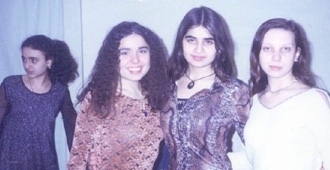 The project, "Let's change the world with common effort!", is based
on the movie, "Pay it Forward," in which you help three people without receiving any money,
present or thanks. In return, you ask each of them to promise to help three
people, too. If you live according to your Laws of Life and would like to share
your experience helping people, please contact [email protected]. The project, "Let's change the world with common effort!", is based
on the movie, "Pay it Forward," in which you help three people without receiving any money,
present or thanks. In return, you ask each of them to promise to help three
people, too. If you live according to your Laws of Life and would like to share
your experience helping people, please contact [email protected].
|
The Ecological Footprint Project for Middle and High School Students
What is an Ecological Footprint?
An "Ecological Footprint" is a measure of the "load" imposed on the natural environment by a
given population and represents the land area necessary to sustain current levels of resource
consumption and waste discharge by the population. Human activities such as eating, traveling,
heating homes, and purchasing consumer items all contribute to ecological footprints. The
measure was invented by Drs. Mathis Wackernagel and William Reese, co-authors of "Our
Ecological Footprint: Reducing Human Impact on the Earth" (New Society Publishers).
Key questions that are addressed by the ecological footprint: "How much space is required for us
to live the way we choose to live?" "How much space do the other species on the Earth need if
they are to survive?" "If everyone lived this way, what would our world look like?" "How can we
take care of our needs and also take care of the earth?" Through exploring footprints, students and
teachers, parents and community members become involved in a study of the impact of their
lifestyles and their dreams on ecological systems (and by extension on our health and well-being).
The measure also gives concrete guidance on practical ways to reduce those impacts and to work
toward sustainability.
What are some goals and objectives for exploring ecological footprints?
Students will understand the ecological impacts of their lifestyles and their society's habits, and
will learn about ways that various societies and, they themselves, may be able to reduce these
impacts.
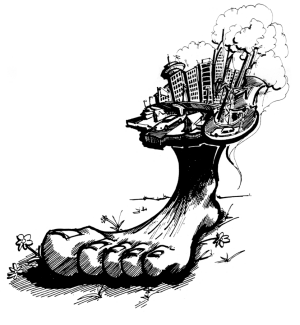 Students will come to develop mindfulness about their lifestyle practices and develop
appreciation for sustainable practices, policies, and design.
Students will come to develop mindfulness about their lifestyle practices and develop
appreciation for sustainable practices, policies, and design.
Using the very conservative assumptions that guide ecological footprint measurement, footprint
analyzers are faced with an inescapable conclusion: many earths would be needed to support a
planet full of humans who consume like those who live in the "First World." Footprint analysis
helps people gain insight into the particular ways that various human activities consume resources
and generate waste. Profound insights into consumption and development can arise from this
project.
The footprint also shines a clarifying spotlight on the gap between rich and poor nations.
Comparing the ecological footprints of different nations make economic disparities and the
differences in access to resources very apparent. Students gain insight into global realities.
This project will tie participants into a growing movement of families, schools, and communities
who are working to learn about their impact on the planet, and who strive, through research, love
and creativity, to lighten this impact.
|
The Child Soldiers Project 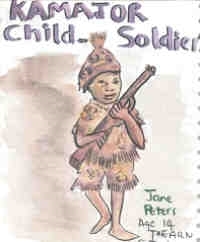 is a project where youth ages 10-19 can bear witness to the issue of the child soldier and how it affects their lives, families, communities and countries. Youth may contribute with stories, drawings, music and audio files recording oral stories. is a project where youth ages 10-19 can bear witness to the issue of the child soldier and how it affects their lives, families, communities and countries. Youth may contribute with stories, drawings, music and audio files recording oral stories.
Students and youth of iEARN Sierra Leone and around the world will continue to bear witness to the problems they or their peers faced as child soldiers.
|
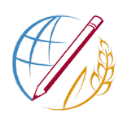 for all ages is a global education initiative from Uganda designed to help young people understand issues of hunger, malnutrition, poverty and food security, and to stimulate them to participate in activities to create a world free from hunger. On World Food Day, October 16th - and throughout the year - students and teachers from all over the world will come together to participate in activities and raise awareness. for all ages is a global education initiative from Uganda designed to help young people understand issues of hunger, malnutrition, poverty and food security, and to stimulate them to participate in activities to create a world free from hunger. On World Food Day, October 16th - and throughout the year - students and teachers from all over the world will come together to participate in activities and raise awareness.
World Food day is celebrated every year to commemorate the founding of the Food and Agriculture Organisation (FAO) of the United Nations in 1945.
|
Page created on 8/2/2014 2:31:01 PM
Last edited 8/2/2014 2:31:01 PM
The beliefs, viewpoints and opinions expressed in this hero submission on the website are those of the author and do not necessarily reflect the beliefs, viewpoints and opinions of The MY HERO Project and its staff.


 to initiate change within the community through action projects.
to initiate change within the community through action projects.
 for all ages is a global education initiative from Uganda designed to help young people understand issues of hunger, malnutrition, poverty and food security, and to stimulate them to participate in activities to create a world free from hunger. On World Food Day, October 16th - and throughout the year - students and teachers from all over the world will come together to participate in activities and raise awareness.
for all ages is a global education initiative from Uganda designed to help young people understand issues of hunger, malnutrition, poverty and food security, and to stimulate them to participate in activities to create a world free from hunger. On World Food Day, October 16th - and throughout the year - students and teachers from all over the world will come together to participate in activities and raise awareness.
 use the Internet and other new technologies to engage
in collaborative educational projects that both enhance learning and make a difference in
the world.
use the Internet and other new technologies to engage
in collaborative educational projects that both enhance learning and make a difference in
the world.